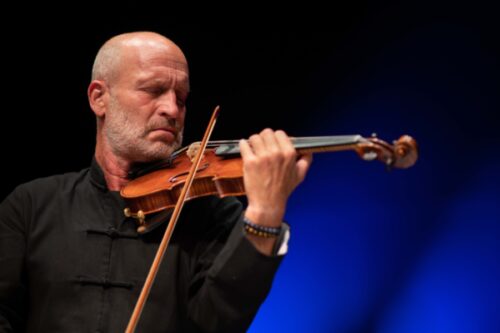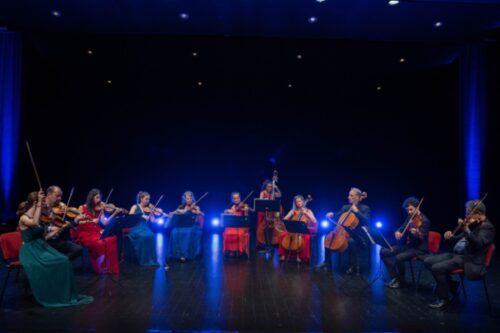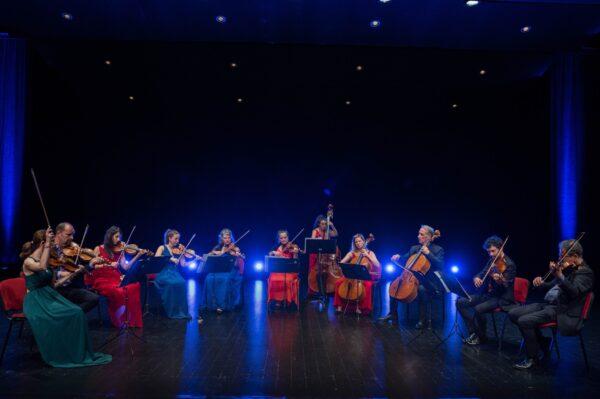 France Various, ‘Musique et Libertés’: Orchestre de chambre de Toulouse / Gilles Colliard (violin / conductor). L’Escale, Tournefeuille, France, 31.5.2023. (LV)
France Various, ‘Musique et Libertés’: Orchestre de chambre de Toulouse / Gilles Colliard (violin / conductor). L’Escale, Tournefeuille, France, 31.5.2023. (LV)

Lully – Divertissement de Chambord (arr. Colliard)
Mozart – Symphony No.36 in C major, K. 425, first movement (arr. Colliard)
Felix Mendelssohn – String Symphony No.10 in B minor, MWV N 10
Fanny Mendelssohn – Chamber Symphony (arr. Colliard)
Chevalier de Saint-Georges – Violin Concerto in D, Op.4 No.1
According to music director Gilles Colliard, the idea for this highly entertaining program by the eleven strings of the Toulouse Chamber Orchestra was the result of a discussion with the Direction des Arts Vivants et Visuels of the Departmental Council of Haute-Garonne, who wanted the orchestra to use music to question societal issues related to human rights. ‘Liberté is a synonym for music’, Colliard explained, ‘because music has no boundaries’.
In fact, when Colliard arrived in 2009 as the Orchestra’s music director, he erased the traditional boundary between the halves of a concert by entirely changing the format. ‘I don’t like concerts in two parts’, he told me during an interview before his Musique et Libertés concert in the posh Toulouse suburb of Tournefeuille. ‘I would rather immerse the audience in a theme by addressing them between each piece during a 75-minute concert – without intermission.’
On this varied program, a Fanny Mendelssohn Chamber Symphony arranged from her string quartet of 1834 made the strongest impression. Adding only a double bass to underline its often deeply moving effects, and played with Colliard listening from the wings, the eleven players needed no conductor to bring out what one commentator has called the composer’s ‘creative questioning of classical harmony’. Whether it was the seemingly free-form first movement, the scherzo inspired perhaps by Paganini’s bell motif from his Second Violin Concerto which Fanny Mendelssohn heard in 1829, the third movement with its restlessly questioning motifs or the exciting finale, the overall feeling was of being lost in music you did not know but definitely wanted to know better.
Since Colliard arrived in the Pink City, the orchestra has recorded a dozen discs for the Klarthe label based near Paris, including a stunning recent release of Robert Schumann’s cello and violin concertos arranged for the strings of the Toulouse orchestra. Unfortunately, they have no plans to record the Fanny Mendelssohn.
It was also a wonderful, almost shocking revelation to hear the first movement of Mozart’s Linz Symphony for strings only, with the woodwinds ingeniously simulated by the superb violists and at other times by its two cellos. Somehow it was even more convincing than Mozart’s own arrangement of his three piano concertos K. 413-415. With the orchestra adding little ornaments towards the end that captured something of the composer’s Turkish operas, it was an unexpected treat.

A Divertissement de Chambord concocted from works by Lully had started off the program as if it were a Masterpiece Theatre presentation, and Fanny’s brother Felix’s String Symphony No.10 was scintillating fun with its hint of late Beethoven quartets, an exquisite cello solo and the orchestra’s evident joy in putting it together, with the players often smiling at each other after particularly brilliant passages. In an unusual cooperative agreement, each of the players owns a share of the orchestra, and the quality is outstanding. Cellist Anne Gaurier is also one of France’s best young viola da gamba virtuosos.
Colliard focused his own virtuosic chops on the D-major Concerto of Joseph Bologne, Chevalier de Saint-Georges (which he described as somewhere ‘between Mozart and Paganini’) for an adventurous series of thrilling, elegant frissons. The concert ended with an encore, the premiere of Colliard’s boundary-erasing arrangement of ‘Three Jewish Songs’, accented by delicious glissando upbeats from the violas.
During the 2023-24 season, the Orchestra will be celebrating its seventieth year since Louis Auriacombe founded it. And although I cannot forget those old recordings, many of them with added winds and solo instruments, the new Toulouse Chamber Orchestra has become something very special. It adds to the excellence of the Orchestre National Capitole Toulouse, recently voted the best orchestra in France, and makes the city a very special musical place to visit indeed.
Laurence Vittes
